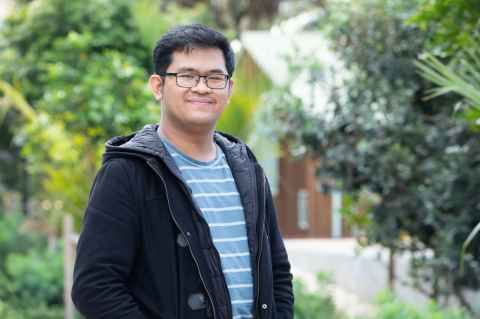Adrian Vargas
A Bachelor of Arts conjoint allows Adrian to forge his own path in the world of music and media.

Key facts:
Programme: Bachelor of Arts, majoring in English and Media and Screen Studies / Bachelor of Music conjoint, specialising in Composition
High school: Sancta Maria College
“I chose to study at the University of Auckland because of the unique combination of majors available and the flexibility to pursue both Music and the Arts at the same time.
“My conjoint degree helps me better navigate the world and understand it. I believe the importance of my degree, and its study of language and art, stems from the necessity of ‘preservation’; the preservation of ideas, cultures, dialects, and stories. It might be through the books we read, the music we listen to, the food we eat, or the ways we greet each other.
“Even as we advance towards a more technologically advanced world, culture remains even more relevant to remembering where we came from, and what inspires us to innovate. In terms of life skills, I feel a better sense of empathy and the ability to relate to people from all different walks of life. No two people are the same, and all stories are worth being told.
“The Bachelor of Arts (BA) appealed to me as I can study English and Media and Screen Studies, some of my favourite subjects in high school, as my majors. I could never have guessed just how fun it would be to discuss literature and film with other like-minded individuals and to delve deep to dissect what makes great art, great.
I love that creativity is at the forefront of both of my degrees. While English usually sees this creativity expressed through essay writing and interpretation, Music often gives me the tools to innovate and compose what hasn’t been done before, and to share this through performance.
“I was particularly drawn to the power of language, and the way we use it to interact with others and portray life. Among my fondest memories are those in debating and presenting speeches, as well as creative writing and filmmaking with my friends.
“I love that even though some courses in these subjects may seem similar, they often couldn’t be more different. Courses I enjoyed the most would put unique spins on the classical essay format and force us to think creatively and critically. When studying the Arts, what is of value is your own interpretation, and the knowledge to back it up.
“One of my favourite courses was ENG219, covering 19th century literature. It embodied exactly what I expected from studying English at a tertiary level, diving into texts and engaging with them every week in new and exciting ways. I got to perform one of my favourite scenes from Wuthering Heights, create an academic seminar on Tess of the D’Urbervilles, and develop a new appreciation for classic literature in a way I wouldn't have had the opportunity to gain outside of that course.
“In my programmes, study and preparation doesn’t manifest itself like in other courses. Rather than drilling formulas or memorising equations, some of the best and most profound discoveries can be found from enthusiastic discussion with the people around you. Your peers can be excellent teachers.
“I have aspired to be a teacher for a long time. Some of the most influential figures in my life have been my teachers and professors, so I only hope to develop my knowledge to the point where I can one day proudly use it to inspire others in the same way my teachers have done for me.
“There is beauty in having the ability to take the time and really analyse what exactly makes something ‘beautiful’ or ‘valuable’. My degree has taught me how to see the beauty and motivation in simple encounters. In the future I want to be able to teach this to young people: to not only chase something that is beautiful, but to also find the beauty in what is here today. My degree will assist greatly in what I plan to do as a career in the future.”